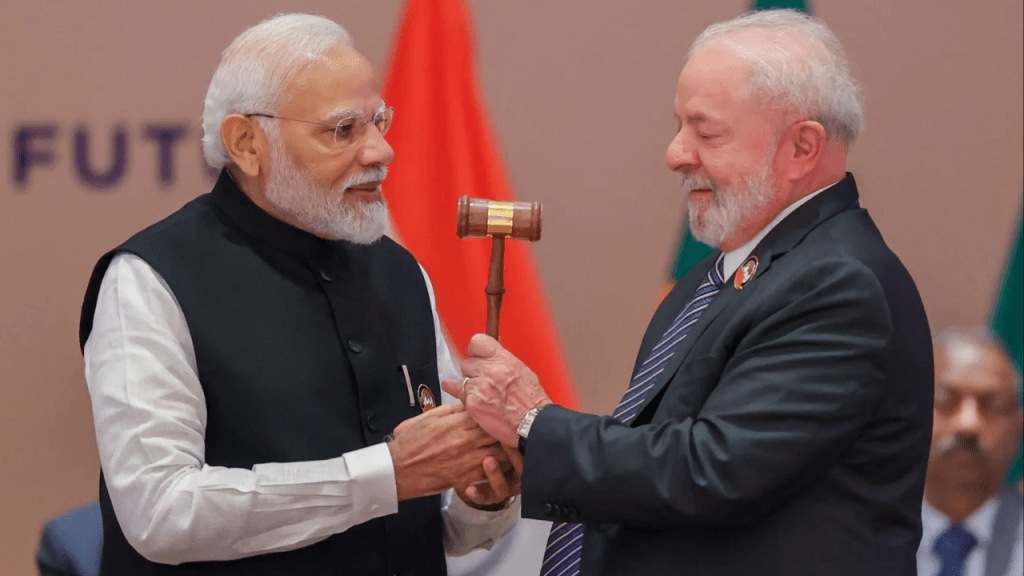As the world prepares for the 19th G20 Summit in Rio de Janeiro on November 18-19, all eyes are on how global leaders will address pressing economic and social challenges. This year’s summit is especially notable as it marks the first time the African Union (AU) will participate as a full member of the G20, an inclusion that underscores the growing importance of multilateral collaboration between emerging economies and advanced nations.
For India, the summit offers an opportunity to continue advancing the priorities it championed during its G20 presidency in 2023, while aligning them with Brazil’s strategic goals for the upcoming year.
Prime Minister Narendra Modi will attend the summit in Brazil as part of a broader diplomatic tour, which also includes visits to Nigeria and Guyana. His presence at the summit will highlight India’s continued engagement with the Global South, where it shares common concerns with emerging economies about global governance, sustainable development, and economic cooperation.
A Shared Vision: Building a Just and Sustainable Planet
The theme of Brazil’s G20 presidency— “Building a Just World and a Sustainable Planet”—strongly aligns with the priorities that India advanced in 2023. As Foreign Secretary Vikram Misri highlighted during a special media briefing in New Delhi ahead of the visit, “the priorities of the Brazilian presidency align very well with the priorities that India had championed and voiced during its presidency of the G20.” Both countries are focused on addressing global issues such as hunger, poverty, energy transitions, and the reform of multilateral institutions.
Brazil’s flagship initiative at this year’s summit, the Global Alliance Against Hunger and Poverty, is a significant step forward in the fight against global inequality. Misri stated that India will play a pivotal role in this initiative, particularly through its involvement in the two main pillars of the alliance—national and knowledge. “India will be joining the national and knowledge pillars of this alliance,” Misri explained, underscoring India’s commitment to addressing hunger and poverty on a global scale. This aligns with the Deccan High-Level Principles on Food Security and Nutrition introduced by India at the 2023 summit.
Energy Transition and Multilateral Reforms
A key area where India and Brazil share common ground is energy transition. India has been a vocal advocate for sustainable energy solutions and has set ambitious goals for renewable energy. Misri noted that at the 2023 G20 summit in New Delhi, India called for tripling renewable energy capacity and doubling energy efficiency by 2030. “The ambition set in Delhi on tripling renewable energy capacity and doubling the rate of energy efficiency by 2030 are again being reaffirmed at the G20 this year,” he said.
In addition to energy, India’s G20 presidency in 2023 emphasized the need for reforming multilateral institutions to make them more inclusive and effective. This priority is being carried forward by Brazil in 2024. Misri highlighted that the discussions on reforming multilateral development banks (MDBs) to ensure they better address the needs of developing economies will be endorsed at this year’s summit. “The G20 roadmap for better, bigger, and more effective MDBs is being endorsed this year,” Misri confirmed, reflecting both countries’ commitment to multilateral solutions that cater to the needs of the Global South.
Modi’s Bilateral Diplomacy: Strengthening Ties with Nigeria and Guyana
In addition to attending the G20 summit, Prime Minister Modi will visit Nigeria and Guyana, further strengthening India’s diplomatic ties with key partners in Africa and Latin America. Nigeria, Africa’s largest economy, plays a crucial role in India’s strategic outreach to the continent. Modi’s visit to Nigeria on November 16-17 will focus on deepening cooperation in sectors like energy, trade, and infrastructure. Misri noted that Nigeria is a key partner for India, especially in expanding collaboration in energy transitions and addressing regional challenges.
Similarly, Modi’s state visit to Guyana from November 19-21 will further solidify ties with this growing Caribbean nation. Guyana’s increasing role in the energy sector, particularly in oil and gas, makes it an important partner for India, as both countries look to collaborate on sustainable development and energy security. Misri explained that the visit to Guyana is significant as both nations share a commitment to addressing global development challenges, particularly in the context of climate change and sustainable economic growth.
Overcoming Geopolitical Challenges at the G20
The G20 summit comes at a time of heightened geopolitical tensions, particularly the ongoing conflict in Ukraine and instability in the Middle East. These conflicts have posed challenges in reaching a consensus on the leaders’ declaration, but Misri expressed confidence that the summit would still produce a consolidated outcome. “I am sure that we will be able to get a good declaration despite the complexities posed by these conflicts,” Misri said in response to a question.
He noted that in previous years, India faced similar challenges in balancing the need for a consensus with the geopolitical realities of the time. “We were then eventually able to have a consensus document in the form of the New Delhi declaration,” he recalled. The G20 Sherpas have already worked on ensuring that geopolitical issues are kept separate from the economic discussions, with any such topics handled through a “chair’s summary,” allowing the main focus of the summit to remain on global development issues.
India-Brazil Cooperation: A Global South Agenda
As the G20 leadership transitions from Brazil to South Africa in 2025, this year’s summit will mark the conclusion of a remarkable run of emerging economies holding the presidency in succession—starting with Indonesia in 2022, followed by India in 2023, and Brazil this year. Misri noted that this trend “caps a run of four emerging markets holding the presidency in succession of the G20,” highlighting the growing influence of the Global South in shaping global governance.
Misri highlighted the empowerment of women as a critical priority for both countries, stating that the Empowerment of Women Working Group, which was first conceived during India’s presidency, “cemented the narrative of women-led development in the G20.”


